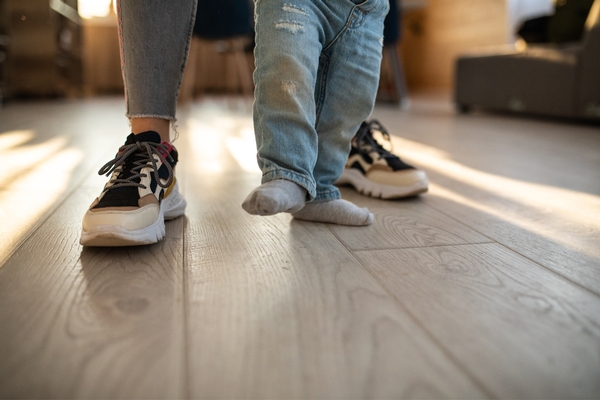Why does my hardwood floor creak when I walk?

A hardwood floor usually cracks for 2 main reasons. Friction between the different elements of the floor and humidity.
We can all say that there is nothing more annoying than a creaking hardwood floor. It's very disappointing to invest in a hardwood floor and realize that it is cracking... It's even an element that could lower the value of your home...
Fortunately, it is possible to repair a creaking floor. By identifying the friction points, it is possible to remedy a noisy floor.
Friction causes your floor to creak
A creaking floor can be associated with 3 main sources of friction:
- Rubbing of the anchoring points of the floorboards in the subfloor;
- Friction between the anchor points of the subfloor and the joists;
- Friction between the wooden slats of the covering.
1. Friction of the anchoring points of the flooring planks in the subfloor
This is probably the most common cause. When we talk about an anchor point, we are talking about the nails or staples that attach the wooden slats to the subfloor.
The floor starts to creak when the anchor points are too small or too few. In this specific case, the noise comes from a vertical movement of the anchor points in the subfloor.
To avoid this situation, it is recommended to glue the rows and not put vapor barrier paper there.
2. Friction between the anchor points of the subfloor and the joists
Ideally, the subfloor is glued to the joists. The joist is the element on which the subfloor is fixed. If the subfloor is only fixed to the joists using anchors (without glue), the risk of friction is much greater.
To avoid movement between these elements as much as possible, the subfloor must be fixed with anchors and glue.
That said, when we renovate a house, whose subfloors are not glued to the joists, the solution is therefore to fix the subfloor well in the required places.
3. Friction between the wooden slats
If the noise is caused by friction between the wooden slats of the covering, it is due to a manufacturing defect. This is the most difficult cause of creaking to predict and the most complex to rectify. Hence the importance of choosing quality floors.
The installation could also be the cause. This is a phenomenon that can happen when the slats are too far apart or too tight. This is why the services of professionals are strongly recommended for the installation of your floor.
To make sure you avoid having a creaking floor, Québec habitation suggests:
- Opt for a plywood subfloor at least 5/8 inch thick
- A bridge screwed and glued to the floor joists
- Adding a paper membrane above the deck
- Nail the subfloor every 8 to 10 inches maximum.
Humidity causes your floor to creak
Humidity is another factor that has a great influence on the cracking of your floors.
A subfloor with a high humidity level will have a real impact on the flooring chosen, such as cherry, ash or oak. A subfloor with a humidity level above 12% will cause the slats to swell. The anchor points can therefore lose their effectiveness and cause a creaking noise when walking.
Floor installation, professionals pay particular attention to the humidity level during installation. It is also an element that has to be constantly monitored. It is important to check the humidity level and the temperature in the house on a regular basis.
In the long run, if the hardwood is wetter than the subfloor, more or less 5%, this causes a deformation on the boards.
The ideal humidity level is between 35% and 55%.
How to fix a creaking floor?
There is no real magic trick to repairing a creaking floor… The best solution is to entrust the repair to experts. They will be able to determine the real cause of the crackles. They will then be able to carry out the repairs that you really need.
At Barwood Pilon, we use special nails that provide better stability. It is a job done by a master hand, both for the installation and for the repair of floors.

